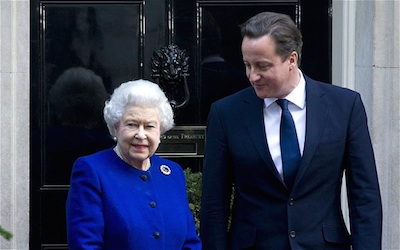
British prime minister David Cameron now looks certain to return to 10 Downing St after the Conservatives secured the narrowest of victories in the Westminster general election.
Mr Cameron said he would govern as “one nation, one United Kingdom” as his party was edging over the line of securing an absolute majority of 326 in the House of Commons.
With counting almost complete, current projections show Cameron’s party set to win 329 seats, a number which still could make him dependent on unionists or others for a workable majority. The result confounded opinion polls taken throughout the campaign, which showed his party falling well short of a majority.
While Labour enjoyed an early lead in terms of seats taken as counting got underway, most of these were regarded as safe Labour seats, and it soon became clear the Conservatives were making significant gains on their 2010 vote.
Mr Cameron retained his seat in Witney at 5.45am and used his speech to say it was “clearly a very strong night” for the Conservatives. He also vowed to press ahead with a referendum on Britain’s membership of the European Union.
“My aim remains simple -- to govern on the basis of governing for everyone in our United Kingdom,” he said.
He made clear his determination to oppose independence for Scotland and Irish unity, saying: “I want to bring our country together, our United Kingdom together, not least by implementing as fast as we can the devolution that we rightly promised.”
But his most immediate problem may be the huge success of the Scottish National Party, who won all but three of Scotland’s 59 Westminster seats. Arriving at the Glasgow count in the early hours of the morning to a hero’s welcome, the SNP leader Nicole Sturgeon was emphatic. “I am feeling absolutely fantastic,” she said. “This is a watershed in the politics of this country and all the SNP candidates must now work to stand up for Scotland. Whatever happens, the government must take heed of what has happened here.”
The House of Commons majority requires control of 326 in the 650 chamber. Without Sinn Fein MPs taking up their seats, that number falls to 324. Excluding the Speaker and deputy speakers, the number could fall to 322.
In contrast, a crestfallen Ed Miliband was reported to be ready to step down as leader of the British Labour Party.
Here are the results so far: (after 635 of 650 seats):
Conservatives 320
Labour 228
SNP 56
Lib Dem 8
DUP 8
Sinn Fein 4
SDLP 3
Plaid Cymru 3
UUP 2
UKIP 1
Green Party 1
![[Irish Republican News]](https://republican-news.org/graphics/title_gifs/rn.gif)
![[Irish Republican News]](https://republican-news.org/graphics/title_gifs/harp.gif)

